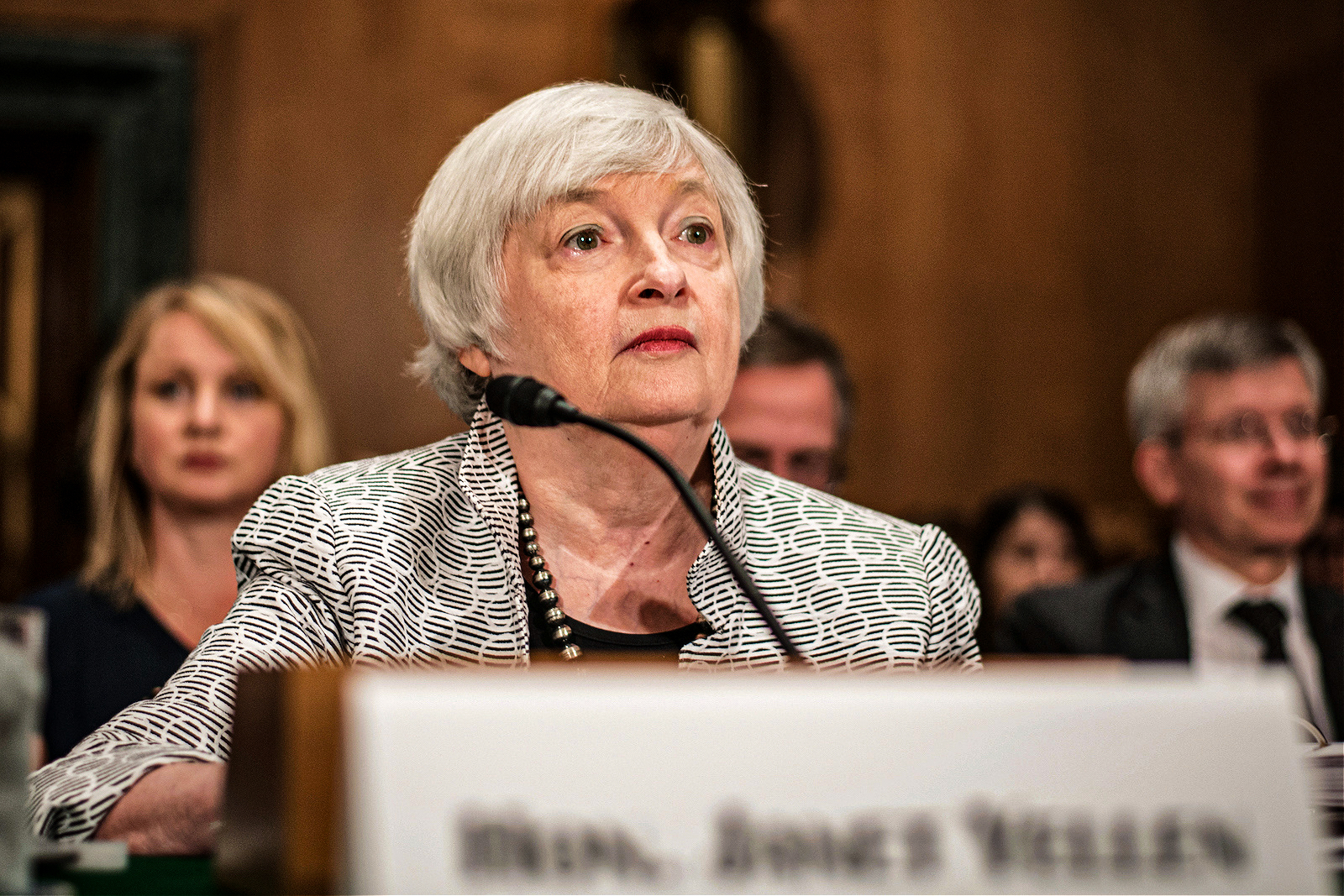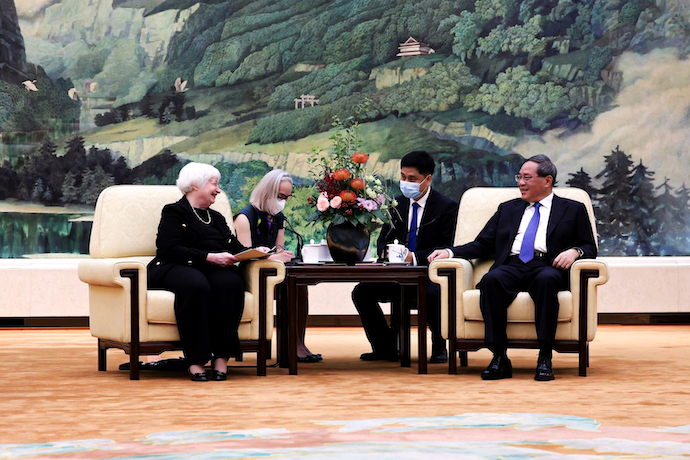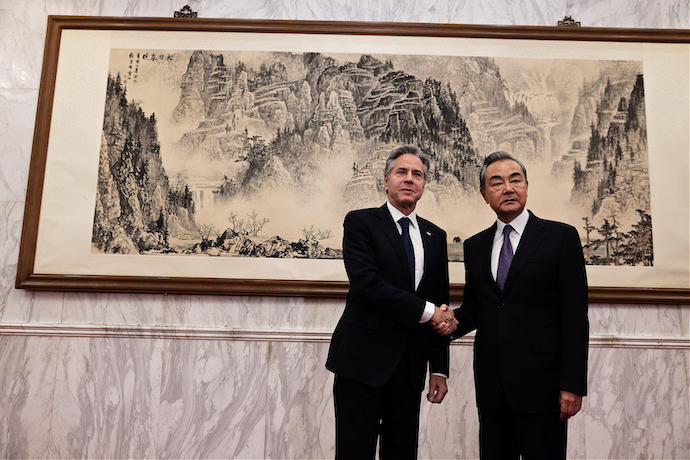
Yellen’s China Trip is a Necessary Step in the Right Direction
U.S. Treasury Secretary Janet Yellen traveled to Beijing on Thursday as part of the Biden administration’s ongoing efforts to improve strained U.S.-China relations. Yellen, who opposes the idea of an economic decoupling from China, has expressed her desire to visit China for some time, emphasizing the need for the two nations to coexist despite strained relations. During her visit, Yellen will engage in discussions with Chinese officials, meet with U.S. companies operating in China, and interact with Chinese citizens.
The trip, which will last until July 9, aims to enhance communication and establish a more regular dialogue between the United States and China. While there are areas of shared interest where progress can be made, a Treasury official noted that there are significant disagreements that cannot be resolved by a single visit.
Recent tensions between the U.S. and China have escalated following President Joe Biden’s description of Chinese President Xi Jinping as a “dictator” during a campaign fundraiser. Although the Chinese government strongly protested, Biden later affirmed that he would not significantly change his frank statements about China. These remarks came in the context of various sources of tension, including the shooting down of a Chinese surveillance balloon by the U.S. military, restrictions on China’s access to advanced computer chips led by the United States, and ongoing concerns about Taiwan’s sovereignty.

Yellen’s visit to China follows Secretary of State Antony Blinken’s recent two-day stop in Beijing, which marked the highest-level meeting between the two countries in the past five years. During Blinken’s visit, he met with Xi, and both sides expressed a desire to stabilize the deteriorating U.S.-China relations. However, they were unable to reach an agreement on improving military communication. While Yellen is not slated to meet with Xi Jinping, she did have meetings with Chinese Premier Li Qiang, former Vice Premier Liu He, and former People’s Bank of China Governor Yi Gang.
Yellen’s trip will primarily focus on stabilizing the global economy and addressing concerns about China’s support for Russia during its ongoing war in Ukraine. China’s growing closeness with Russia, including joint military exercises and frequent state visits, has raised concerns among U.S. officials. Nevertheless, there remains hope that U.S.-China relations can avoid further deterioration.
There are several key tensions that exist between China and other countries. One significant area of contention involves territorial disputes, particularly in the South China Sea. China’s assertive claims and construction of artificial islands in the disputed waters have sparked concerns among neighboring countries and prompted an increased military presence from the United States. This issue has led to a heightened risk of maritime clashes and regional instability.
Economic factors also contribute to tensions. China’s trade practices, such as intellectual property theft, forced technology transfers, and unfair trade practices, have drawn criticism from various countries, including the U.S. and the European Union. These concerns about economic imbalances and the perceived lack of market access have led to trade disputes, tariffs, and barriers, exacerbating tensions between China and its trading partners.
Human rights and ideological differences present another source of tension. China’s track record on human rights, including its treatment of ethnic minorities, censorship, and restrictions on freedom of speech, has faced international condemnation. These issues have strained relations with countries advocating for human rights and democratic values, leading to calls for accountability and transparency from Beijing.

Additionally, cybersecurity and technology have emerged as areas of concern. Allegations of state-sponsored cyber espionage and theft of intellectual property by Chinese entities have raised cybersecurity concerns globally. The development of advanced technologies, such as 5G networks and artificial intelligence, has also created concerns over data privacy, surveillance, and national security, leading to debates about the risks associated with China’s technological influence.
China’s increasing global influence and its aspirations for regional dominance, as well as its Belt and Road Initiative, have raised concerns about China’s strategic intentions. This has prompted responses from countries seeking to curb China’s influence or protect their own interests, leading to competition and potential conflicts of interest.
These tensions across territorial, economic, human rights, cybersecurity, and geopolitical domains reflect the complexities and challenges in the relationship between China and other nations, especially the U.S. Managing and addressing these issues requires diplomacy, dialogue, and cooperative efforts to find common ground and establish a more stable and constructive relationship.
Resolving specific differences between the U.S. and China requires a multifaceted approach that combines diplomacy, cooperation, and engagement on various fronts. Maintaining open lines of communication through high-level diplomatic channels is essential. Regular engagement between leaders, diplomats, and officials can facilitate understanding, promote dialogue, and address concerns over a broad range of issues, including trade, security, human rights, and regional stability.
The U.S. will need to manage security concerns which are vital for regional stability. Open channels of communication can help prevent misunderstandings and reduce the risk of military escalation. Establishing mechanisms for crisis management and risk reduction can enhance security cooperation and promote stability in the Asia-Pacific region.
Both countries should place a heavy focus on cultural exchanges, educational programs, and people-to-people interactions which can foster mutual understanding and build trust between the two nations. Facilitating cultural diplomacy, promoting academic exchanges, and increasing opportunities for citizens to engage with one another can bridge divides and promote empathy and cooperation.
It is crucial for both the U.S. and China to approach their differences with a willingness to listen, find common ground, and seek win-win outcomes. While challenges exist, it can be expected that Yellen’s visit will demonstrate a commitment to diplomacy and mutual respect. This path of constructive engagement can help pave the way for a more stable and productive relationship between the two influential global powers.

